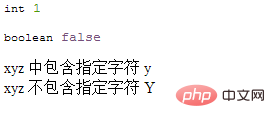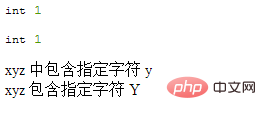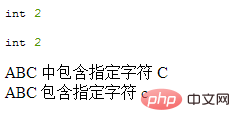 Backend Development
Backend Development
 PHP Problem
PHP Problem
 How to determine whether a specified character is in a string in php
How to determine whether a specified character is in a string in php
How to determine whether a specified character is in a string in php
Judgment method: 1. Use strpos(). If the specified character exists, return the position where it first appears; if not found, return FALSE. 2. Use strrpos(). If the specified character exists, it returns the position of the last occurrence; if it is not found, it returns FALSE. 3. Use stripos(), if it is, return the position where it first appears. 4. Use strripos(), if it is, return the last occurrence position. 5. Use explode(), if the returned array is not empty.

The operating environment of this tutorial: windows7 system, PHP version 8.1, DELL G3 computer
php Detect whether a string contains another string
Method 1: Use the strpos() function to detect
The strpos() function can find characters The position of the first occurrence of a string within another string (case-sensitive).
If the specified character exists, return the position of the first occurrence; if not found, return FALSE.
Note: The string position starts from 0, not from 1.
Example:
<?php
header('content-type:text/html;charset=utf-8');
$findme1 = 'y';
$findme2 = 'Y';
$mystring = 'xyz';
$pos1 = strpos($mystring, $findme1);
$pos2 = strpos($mystring, $findme2);
var_dump($pos1);
var_dump($pos2);
if($pos1){
echo $mystring." 中包含指定字符 $findme1 <br>";
}else{
echo $mystring." 中不包含指定字符 $findme1 <br>";
}
if($pos2){
echo $mystring." 包含指定字符 $findme2 <br>";
}else{
echo $mystring." 不包含指定字符 $findme2 <br>";
}
?>
Method 2: Use strrpos() function to detect
strrpos() function can Finds the last occurrence of a string within another string (case sensitive).
If the specified character exists, return the position of the last occurrence; if not found, return FALSE.
Example:
<?php
header('content-type:text/html;charset=utf-8');
$findme1 = 'C';
$findme2 = 'c';
$mystring = 'ABC';
$pos1 = strrpos($mystring, $findme1);
$pos2 = strrpos($mystring, $findme2);
var_dump($pos1);
var_dump($pos2);
if($pos1){
echo $mystring." 中包含指定字符 $findme1 <br>";
}else{
echo $mystring." 中不包含指定字符 $findme1 <br>";
}
if($pos2){
echo $mystring." 包含指定字符 $findme2 <br>";
}else{
echo $mystring." 不包含指定字符 $findme2 <br>";
}
?>
Method 3: Use the stripos() function
stripos() function to find The position of the first occurrence of a string within another string (case-insensitive).
If the specified character exists, return the position of the first occurrence; if not found, return FALSE.
<?php
header('content-type:text/html;charset=utf-8');
$findme1 = 'y';
$findme2 = 'Y';
$mystring = 'xyz';
$pos1 = stripos($mystring, $findme1);
$pos2 = stripos($mystring, $findme2);
var_dump($pos1);
var_dump($pos2);
if($pos1){
echo $mystring." 中包含指定字符 $findme1 <br>";
}else{
echo $mystring." 中不包含指定字符 $findme1 <br>";
}
if($pos2){
echo $mystring." 包含指定字符 $findme2 <br>";
}else{
echo $mystring." 不包含指定字符 $findme2 <br>";
}
?>
Method 4: Use the strripos() function to detect
The strripos() function can find a string in another string The position of the last occurrence in (not case sensitive).
If the specified character exists, return the position of the last occurrence; if not found, return FALSE.
<?php
header('content-type:text/html;charset=utf-8');
$findme1 = 'C';
$findme2 = 'c';
$mystring = 'ABC';
$pos1 = strripos($mystring, $findme1);
$pos2 = strripos($mystring, $findme2);
var_dump($pos1);
var_dump($pos2);
if($pos1){
echo $mystring." 中包含指定字符 $findme1 <br>";
}else{
echo $mystring." 中不包含指定字符 $findme1 <br>";
}
if($pos2){
echo $mystring." 包含指定字符 $findme2 <br>";
}else{
echo $mystring." 不包含指定字符 $findme2 <br>";
}
?>
Method 5: Use the explode() function to detect
explode() function uses the specified delimiter to split a string , and returns an array of strings.
If the array is not an empty array (the array length is greater than 1), it is included; otherwise, the array is empty and does not contain another string
<?php
header('content-type:text/html;charset=utf-8');
$url = "001a.gif";
$str = "a";
$con = explode($str,$url);
if (count($con)>1){
echo $url." 中包含 ".$str;
}else{
echo $url." 中没有包含 ".$str;
}
?>
Recommended learning: "PHP Video Tutorial"
The above is the detailed content of How to determine whether a specified character is in a string in php. For more information, please follow other related articles on the PHP Chinese website!

Hot AI Tools

Undresser.AI Undress
AI-powered app for creating realistic nude photos

AI Clothes Remover
Online AI tool for removing clothes from photos.

Undress AI Tool
Undress images for free

Clothoff.io
AI clothes remover

AI Hentai Generator
Generate AI Hentai for free.

Hot Article

Hot Tools

Notepad++7.3.1
Easy-to-use and free code editor

SublimeText3 Chinese version
Chinese version, very easy to use

Zend Studio 13.0.1
Powerful PHP integrated development environment

Dreamweaver CS6
Visual web development tools

SublimeText3 Mac version
God-level code editing software (SublimeText3)

Hot Topics
 1385
1385
 52
52
 PHP 8.4 Installation and Upgrade guide for Ubuntu and Debian
Dec 24, 2024 pm 04:42 PM
PHP 8.4 Installation and Upgrade guide for Ubuntu and Debian
Dec 24, 2024 pm 04:42 PM
PHP 8.4 brings several new features, security improvements, and performance improvements with healthy amounts of feature deprecations and removals. This guide explains how to install PHP 8.4 or upgrade to PHP 8.4 on Ubuntu, Debian, or their derivati
 How To Set Up Visual Studio Code (VS Code) for PHP Development
Dec 20, 2024 am 11:31 AM
How To Set Up Visual Studio Code (VS Code) for PHP Development
Dec 20, 2024 am 11:31 AM
Visual Studio Code, also known as VS Code, is a free source code editor — or integrated development environment (IDE) — available for all major operating systems. With a large collection of extensions for many programming languages, VS Code can be c
 7 PHP Functions I Regret I Didn't Know Before
Nov 13, 2024 am 09:42 AM
7 PHP Functions I Regret I Didn't Know Before
Nov 13, 2024 am 09:42 AM
If you are an experienced PHP developer, you might have the feeling that you’ve been there and done that already.You have developed a significant number of applications, debugged millions of lines of code, and tweaked a bunch of scripts to achieve op
 How do you parse and process HTML/XML in PHP?
Feb 07, 2025 am 11:57 AM
How do you parse and process HTML/XML in PHP?
Feb 07, 2025 am 11:57 AM
This tutorial demonstrates how to efficiently process XML documents using PHP. XML (eXtensible Markup Language) is a versatile text-based markup language designed for both human readability and machine parsing. It's commonly used for data storage an
 Explain JSON Web Tokens (JWT) and their use case in PHP APIs.
Apr 05, 2025 am 12:04 AM
Explain JSON Web Tokens (JWT) and their use case in PHP APIs.
Apr 05, 2025 am 12:04 AM
JWT is an open standard based on JSON, used to securely transmit information between parties, mainly for identity authentication and information exchange. 1. JWT consists of three parts: Header, Payload and Signature. 2. The working principle of JWT includes three steps: generating JWT, verifying JWT and parsing Payload. 3. When using JWT for authentication in PHP, JWT can be generated and verified, and user role and permission information can be included in advanced usage. 4. Common errors include signature verification failure, token expiration, and payload oversized. Debugging skills include using debugging tools and logging. 5. Performance optimization and best practices include using appropriate signature algorithms, setting validity periods reasonably,
 PHP Program to Count Vowels in a String
Feb 07, 2025 pm 12:12 PM
PHP Program to Count Vowels in a String
Feb 07, 2025 pm 12:12 PM
A string is a sequence of characters, including letters, numbers, and symbols. This tutorial will learn how to calculate the number of vowels in a given string in PHP using different methods. The vowels in English are a, e, i, o, u, and they can be uppercase or lowercase. What is a vowel? Vowels are alphabetic characters that represent a specific pronunciation. There are five vowels in English, including uppercase and lowercase: a, e, i, o, u Example 1 Input: String = "Tutorialspoint" Output: 6 explain The vowels in the string "Tutorialspoint" are u, o, i, a, o, i. There are 6 yuan in total
 Explain late static binding in PHP (static::).
Apr 03, 2025 am 12:04 AM
Explain late static binding in PHP (static::).
Apr 03, 2025 am 12:04 AM
Static binding (static::) implements late static binding (LSB) in PHP, allowing calling classes to be referenced in static contexts rather than defining classes. 1) The parsing process is performed at runtime, 2) Look up the call class in the inheritance relationship, 3) It may bring performance overhead.
 What are PHP magic methods (__construct, __destruct, __call, __get, __set, etc.) and provide use cases?
Apr 03, 2025 am 12:03 AM
What are PHP magic methods (__construct, __destruct, __call, __get, __set, etc.) and provide use cases?
Apr 03, 2025 am 12:03 AM
What are the magic methods of PHP? PHP's magic methods include: 1.\_\_construct, used to initialize objects; 2.\_\_destruct, used to clean up resources; 3.\_\_call, handle non-existent method calls; 4.\_\_get, implement dynamic attribute access; 5.\_\_set, implement dynamic attribute settings. These methods are automatically called in certain situations, improving code flexibility and efficiency.



